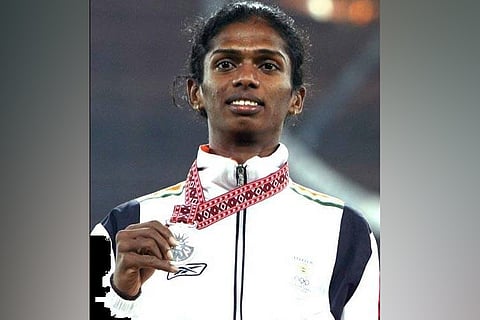

For over a decade now, South African athlete and two-time Olympic champion, Caster Semenya's body has been under scrutiny. Since her victory in the 2009 World Track and Field Championships, she has been subjected to one test after another, as her every win was dissected and pinned to the levels of testosterone her body naturally generates. Despite this, Caster kept running, not away from the insults and hurdles thrown at her but towards the limelight, clearly faster than those determined to pull her down.
And watching this woman's success with pride and happiness was Santhi Soundarajan, an athlete from Tamil Nadu in India, whose dreams were shattered due to similar discrimination. Santhi, who started out young, had won a dozen track and field events for the country but was stripped off a silver medal won at the 2006 Asian Games after failing a gender verification test which disputed her eligibility to participate in the women's competition. Following this, the Indian Olympic Association told her that she could not compete any longer.
Santhi recalls to TNM that this decision shattered her every dream and over the next decade, as her efforts to return to the track proved futile, she grew more and more depressed. It was in 2016, when she was at her lowest, that Caster sent her a personal message.
"This was right after she won a gold in the Rio Olympics. Caster said she knows my struggle and assured me that I have her support. It made me really happy to hear this when I was feeling like I had lost everything," says Santhi. And now, just days after the Court of Arbitration for Sport, the highest court in international sports, ruled against Caster and made it clear that female track athletes with naturally elevated levels of testosterone cannot participate in major races without hormone therapy, Santhi declares, "It is my turn to support her against this blatant violation of her human rights."
‘Discrimination against minorities’
The ruling has been termed 'arbitrary and political', and has received backlash from athletes, and activists alike. And Santhi is amongst those ready to back Caster in this fight against 'discrimination'.
"At a time when we are trying to move towards acceptance of gender fluidity, this ruling once again tries to narrow down what it means to be a woman," says Santhi. "This is a clear discrimination against minorities by the larger majority," she adds.
The former athlete further questions the reasoning behind the court's decision.
"This is something Caster has been born with. If a woman is very tall and participates in a track event, will the shorter runners say this is a biological advantage because she can make larger strides? Why should she take hormonal therapy and change who she is to participate? Olympian Michael Phelps has a genetic advantage where he produces only half the lactic acid compared to an average human being. Why was he not stopped? His genetic differences were celebrated but for a woman it is a cause for exclusion," she adds.
Caster had called the new rule, which is scheduled to go into effect in November for races from 400 meters to one mile, as 'discriminatory, irrational, unjustifiable and a violation of the rules of sport and universally-recognized human rights'.
Santhi too points out that sports is meant to be inclusive.
"But here too they have brought division to ruin people's lives. This new decision has no positive effect. All the elite sportspersons should raise their voice against it," says Santhi. "The fact that Caster has been so successful has created several enemies for her," she adds.
The former athlete, who is now a coach, doesn't want to see the injustice meted out to her to be repeated.
"Don't do this to female athletes," she appeals to the international court. "My life is completely shattered because of your wrong judgement. I have become nothing. Don't ruin more lives. Your decision doesn't just affect us on the track but also derails everything in the world outside of it."